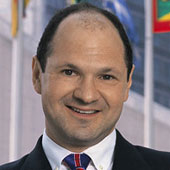The World That Bush Built
The often overlooked factor that definitely changed the global equation for the worse is the ignorance and bombast of George W. Bush and his presidency.
December 7, 2023

The historian Barbara W. Tuchman wrote a famous essay in Foreign Affairs in October 1972 under the title “If Mao Had Come to Washington.” She speculated that the path of U.S.-Chinese history, especially contentious at this stage, may well have been a different, more cooperative one if that visit had happened.
By the same token, it is high time to ask where the world would stand today, if George W. Bush had not been unconventionally selected as the 43rd President of the United States by the country‘s Supreme Court.
Remember the start of the new century?
For an answer, let us start with what the world looked like in 2001. At the start of the new century, the United States found itself in the strongest position economically, politically and militarily since the early post-World War Two decades.
It had won the Cold War. The Berlin Wall had come down. The Soviet empire had crumbled. And even Russia’s Vladimir Putin, whatever his innermost thoughts, felt it was more prudent to join the United States and the West than to keep confronting it.
Invincible U.S. military
With the collapse of Communism, the apparent global triumph of U.S. democracy was even declared the “End of History.” Europe, for its part, was unified for the first time since World War One. Pretty much the entire continent was allied with Washington.
The United States’ own military power was second to none. In 1990/91, George H.W. Bush, the 41st U.S. President – and the father of George W. Bush – had used this power on a small scale to liberate Kuwait.
The quick victory there convinced the world that the United States was invincible. And when Bill Clinton in 1991 decided to bomb Belgrade in order to stop genocide in Kosovo, Serbia promptly caved in.
Plus a booming economy
Back then, the U.S. economy was on a remarkably solid footing as well. U.S. companies, many of them founded by a new breed of entrepreneurs, were effecting a grandiose technological revolution.
The second half of the 1990s saw a remarkable economic boom. The U.S. federal government ran a string of annual budget surpluses which were projected to extend far into the future.
One hundred years before, the United States’ rapid economic development had inaugurated the American Century. The 21st century seemed destined to become, if anything, even more American.
What could have gone wrong? In a word, George W. Bush
We live in a world created by Bush Jr., or, more precisely, by his ill-fated response to the September 11, 2001, terrorist attacks in the United States.
Instead of treating this event as a limited challenge, the 43rd President of the United States (and, in true dynastic fashion, the son of the 41st), initiated the all-encompassing Global War on Terror, or GWOT. Its centerpiece was the twin invasions of Afghanistan and Iraq.
A report by Brown University found the wars had cost the United States a cool $8 trillion. Notably, that was more than the $6 trillion in total federal government debt the United States had accumulated up to that point during all of the country’s history.
The debt-to-GDP ratio ballooned from 55% at the start of the century to 120% today, reaching an unfathomable $33.7 trillion.
Fueling inequality
That was due to many factors, including the COVID 19 pandemic. However, it was Bush, Jr., who combined a massive increase in war spending with tax cuts – a trick that has been adopted by every U.S. administration since.
Moreover, those tax cuts favored the rich, and led to the inevitable scrapping of the United States’ already inadequate safety net. That further exacerbated the economic divisions in the country, which inevitably translated into the irreconcilable political divisions which we see today.
Bush’s bombast in action
As far as fighting terrorism, Mr. Bush’s GWOT was a dismal failure. Days after 9/11 he declared: “Our war on terror begins with al Qaeda but it does not end there. It will not end until every terrorist group of global reach is found, stopped and defeated.”
Yet, the Hamas attack in Israel shows that global terrorism, and specifically radical Islamic terrorism, is alive and well. If anything, the wars in Iraq and Afghanistan radicalized many young Muslims, creating a fertile ground for terrorist recruitment.
Empowering Iran
Worse, Bush’s true act of true lunacy was launching a war in Iraq. Thereby, he destroyed the only regional counterweight to Iran and brought Iraqi Shiites, potential Iranian allies, to power in Baghdad.
Despite strict economic sanctions, Iran has expanded its influence. It formed a de facto alliance with Russia’s despotic Mr. Putin. The men-only pseudo-theocratic regime in Teheran supplied drones for Putin’s war in Ukraine, getting as yet unknown technologies from Russia in return.
On October 7, Israel woke up to the reality of being hemmed in by Iranian allies and proxies – by Hamas in Gaza, Hezbollah in Lebanon, Bashar al-Assad in Syria and Houthis in Yemen.
The two long wars in Iraq and Afghanistan, despite all the money and effort spent, led to no resolution. They only led to a deep morass, and dealt a major blow to the United States’ international standing.
The country’s military power, widely feared as a threat, turned out to be less formidable when deployed in the field. Ragtag bands of rebels not only inflicted serious casualties on U.S. forces with homemade devices, but won and held substantial territories as well.
Putin learned the lessons
In Moscow, Putin, too, drew lessons from the American experience. He cited the invasion of Iraq as a justification for his war in Ukraine: If Washington could use force to advance its interests, why could Moscow not do the same? Never mind that the humiliating withdrawal from Afghanistan in 2021 convinced him that the United States is a paper tiger.
Finally, protracted wars which ended in failure have created domestic disillusionment with any involvement abroad. Donald Trump’s “America First” slogan, and his – largely only rhetorical – promise to use the country’s resources not in foreign misadventures, but for the benefit of its citizens, was an important aspect of his electoral appeal.
Despite Joe Biden’s support for Ukraine and decisive response to the Hamas atrocities, the United States’ reluctance to engage abroad endures, and will continue to hamper its ability to project its military power to fight foreign wars and to assist its allies.
Conclusion
As all of us ponder the question why the world is in such a mess, we realize that there are many causes. The one factor, though, that triggered the change of the global equation for the worse is the ignorance and bombast of George W. Bush.
Epilogue: A look ahead to 2024
Of course, in the context of current news from the United States, it bears remembering that, long before the curious actions of the U.S. Supreme Court in shaping the outcome of the 2008 election, the self-ascribed activist consumer hero, Ralph W. Nader, and his act of extreme vanity in running as a presidential candidate was a critical factor in electing Bush Junior.
That same sad history may well repeat itself in the upcoming 2024 U.S. presidential elections, this time via candidates like Robert F. Kennedy, Jr. and Cornel West. They may will prove to be instrumental in the reelection of Donald Trump.
Takeaways
We live in a world created by Bush Jr., or, more precisely, by his response to the September 11, 2001, terrorist attacks in the United States.
The ignorance and bombast George W. Bush displayed during his presidency definitely changed the global equation for the worse.
Bush's tax cuts, which favored the rich, led to the inevitable scrapping of the U.S.'s already inadequate safety net. That inevitably translated into the irreconcilable political divisions which we see today.
Bush's bombast? Days after 9/11 he declared: “Our war on terror begins with al Qaeda but it does not end there. It will not end until every terrorist group of global reach is found, stopped and defeated.”
The two long wars in Iraq and Afghanistan, despite all the money and effort spent, led to no resolution and dealt a major blow to the U.S.’s international standing.
Protracted wars which ended in failure have created domestic disillusionment with any involvement abroad. Donald Trump’s “America First” slogan was an important aspect of his electoral appeal.
Putin drew lessons from the U.S.'s experience, citing the invasion of Iraq as justification for his war in Ukraine: If Washington could use force to advance its interests, why could Moscow not do the same?
Bush’s true act of true lunacy was launching a war in Iraq. Thereby, he destroyed the only regional counterweight to Iran and brought Iraqi Shiites, potential Iranian allies, to power in Baghdad.


